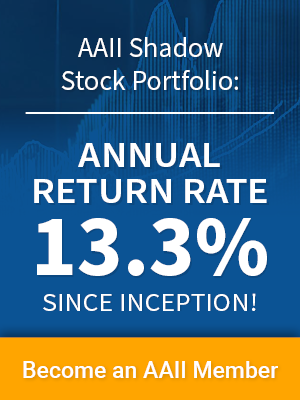Based on key financial metrics such as the price-to-sales ratio, shareholder yield and the price-earnings ratio, the following 3 stocks made the list for top value stocks in the REITs - Specialized industry. Those looking for value stocks to add to their portfolio may want to use this list as a starting point for further investment research.
Why Focus on Undervalued REITs - Specialized Stocks?
Value investors seek to buy stocks at a discount to their intrinsic value. Long-term returns show that such strategies are advantageous. Value stocks, as a group, tend to outperform growth stocks over extended periods of time. Typically, value investors perform financial analysis of numerous metrics, don’t follow the herd and are long-term investors.
AAII’s A+ Investor Value Grade is derived from a stock’s Value Score. The Value Score is the percentile rank of the average of the percentile ranks of the price-to-sales ratio, price-earnings ratio, enterprise-value-to-EBITDA (EV/EBITDA) ratio, shareholder yield, price-to-book-value ratio and price-to-free-cash-flow ratio. The score is variable, meaning it can consider all six ratios or, should any of the six ratios not be valid, the remaining ratios that are valid. To be assigned a Value Score, stocks must have a valid (non-null) ratio and corresponding ranking for at least two of the six valuation ratios.
What Goes Into AAII’s Value Grade?
Stock evaluation requires access to huge amounts of data as well as the knowledge and time to sift through it all, make sense of financial ratios, read income statements and analyze recent stock movement. AAII created A+ Investor, a robust data suite that condenses data research in an actionable and customizable way suitable for investors of all knowledge levels, to help investors with that task.
AAII’s proprietary stock grades come with A+ Investor. These offer intuitive A–F grades for more than just value. It is possible for a stock to appear cheap based on one valuation metric but appear expensive on another. It is also possible for one valuation ratio to be associated with outperforming stocks during certain periods of time but not others. Some stocks may even have null values for certain metrics like the price-earnings ratio or the price-to-book ratio but not others. An example of this would be a company with losses instead of profits or a negative book value because of heavy borrowing. Negative earnings or book value result in non-meaningful ratios that are left blank or null.
Click the button below to learn more about A+ Investor and subscribe today.

3 Undervalued REITs - Specialized Stocks
Of course, there are countless value stocks that are worth mentioning, but this is a concise list of the top 3 undervalued stocks in the REITs - Specialized industry for Wednesday, March 01, 2023. Let’s take a closer look at their individual scores to see how they measure up against each other and the REITs - Specialized industry median.
| Company | Ticker | Price/Sales | Price/Earnings | EV/EBITDA | Shareholder Yield | Price/Book Value | Price/Free Cash Flow | Value Grade |
| Mfa Financial Inc | MFA | na | na | na | 20.1% | 0.55 | 6.2 | A |
| Park Hotels & Resorts Inc | PK | 1.24 | 19.0 | 11.4 | 8.2% | 0.71 | 13.2 | B |
| PennyMac Mortgage Investment Trust | PMT | 1.63 | na | 204.7 | 19.8% | 0.82 | 0.8 | B |
The Value Grade is assigned based on how each stock’s composite valuation compares to all other stocks.
The process for assigning grades starts with each variable for a given stock. The percentile rankings for all valid ratios that a stock has are calculated. So, for instance, a stock could have a price-to-book ranking in the 43rd percentile, a price-earnings ranking in the 67th percentile, a price-to-sales ranking in the 23rd percentile, etc. Then, those rankings are averaged for each stock. (A minimum of two valid variables are required, though all six will be used if available.)
Once the average of the individual variables is calculated, that average is ranked against all stocks. Put another way, each stock’s composite valuation is compared to all other stocks. These ranks are then sorted into quintiles from the cheapest 20% (a grade of A) to the most expensive 20% (a grade of F).
As always, we recommend that you conduct proper due diligence and research before investing in any security. We also suggest that investors utilize numerous grades, not just value, when it comes to deciding whether a company is a good fit for their allocation needs.
Mfa Financial Inc’s Value Grade
Value Grade:
| Metric | Score | MFA | Industry Median |
| Price/Sales | na | na | 2.82 |
| Price/Earnings | na | na | 19.0 |
| EV/EBITDA | na | na | 17.6 |
| Shareholder Yield | 2 | 20.1% | 2.8% |
| Price/Book Value | 11 | 0.55 | 0.99 |
| Price/Free Cash Flow | 18 | 6.2 | 30.9 |
MFA Financial, Inc. is an internally-managed real estate investment trust that invests in and finances residential mortgage assets. The Company’s targeted investments include principally residential whole loans, including purchased performing loans, purchased credit deteriorated and purchased non-performing loans. The Company also owns residential real estate (REO); residential mortgage securities, including credit risk transfer securities, and MSR-related assets, which include term notes backed directly or indirectly by mortgage servicing rights (MSRs). The Company’s principal business objective is to deliver shareholder value through the generation of distributable income and through asset performance linked to residential mortgage credit fundamentals. The Company selectively invests in residential mortgage assets with a focus on credit analysis, projected prepayment rates, interest rate sensitivity and expected return.
Stocks with a Value Score from 81 to 100 are considered deep value, those with a score between 61 and 80 are value and so on.
Mfa Financial Inc has a Value Score of 99, which is considered to be undervalued.
Shareholder yield is the sum of a stock’s dividend yield (paid over previous 12 months minus special dividends) and the percentage of net share buybacks over the previous 12 months. Mfa Financial Inc’s shareholder yield is higher than its industry median ratio of 2.79%. Value investors may look for an attractive shareholder yield because it can be a powerful tool for identifying if the company has a good management team.
As one of the most common value metrics, the price-to-book ratio evaluates a company’s current market price relative to its book value. Mfa Financial Inc’s price-to-book ratio is lower than its industry median ratio of 0.99. This could make Mfa Financial Inc more attractive to investors looking for a new addition to their portfolio.
Lastly, let’s take a look at Mfa Financial Inc’s price-to-free-cash-flow ratio (P/FCF), which can indicate a company’s market value relative to its operating cash flow. Mfa Financial Inc’s price-to-free-cash-flow ratio is lower than its industry median ratio of 30.93. This could make Mfa Financial Inc more attractive because the lower P/FCF ratio indicates that Mfa Financial Inc is undervalued. The P/FCF ratio metric can also be viewed over a long-term time frame to see if the company's cash flow to share price value is generally improving or worsening.
Park Hotels & Resorts Inc’s Value Grade
Value Grade:
| Metric | Score | PK | Industry Median |
| Price/Sales | 38 | 1.24 | 2.82 |
| Price/Earnings | 57 | 19.0 | 19.0 |
| EV/EBITDA | 58 | 11.4 | 17.6 |
| Shareholder Yield | 9 | 8.2% | 2.8% |
| Price/Book Value | 16 | 0.71 | 0.99 |
| Price/Free Cash Flow | 41 | 13.2 | 30.9 |
Park Hotels & Resorts Inc. is a lodging real estate investment trust. The Company has a portfolio of hotels and resorts, which consists of approximately 54 hotels and resorts with over 32,000 rooms located in the United States and international markets. Its portfolio includes hotels in urban and convention areas, such as New York City, Washington, D.C., Chicago, San Francisco, Boston, New Orleans and Denver; resorts in leisure destinations, including Hawaii, Orlando, Key West and Miami Beach; and hotels adjacent to gateway airports, such as Los Angeles International, Boston Logan International and Miami International, as well as hotels in select suburban locations. Its brand affiliations include Hilton Hotels & Resorts, DoubleTree by Hilton, Embassy Suites by Hilton, W Hotels, Hyatt Regency, Waldorf Astoria Hotels & Resorts, Marriott Tribute Portfolio, Curio - A Collection by Hilton, JW Marriott, Hyatt Centric, Hilton Garden Inn, Homewood Suites by Hilton and Hampton by Hilton.
Stocks with a Value Score from 81 to 100 are considered deep value, those with a score between 61 and 80 are value and so on.
Park Hotels & Resorts Inc has a Value Score of 74, which is considered to be undervalued.
Park Hotels & Resorts Inc’s price-earnings ratio is 19.0 compared to the industry median at 19.0. This means that it has a higher price relative to its earnings compared to its peers. This makes Park Hotels & Resorts Inc fairly attractive for value investors.
Park Hotels & Resorts Inc’s price-to-book ratio is higher than its peers. This could make Park Hotels & Resorts Inc less attractive for value investors when compared to the industry median at 0.99.
You can read more about Park Hotels & Resorts Inc’s key financial metrics like shareholder yield, price-to-free-cash-flow and EV/EBITDA ratio, or learn more about its Momentum and Growth Grades, by subscribing to A+ Investor.
PennyMac Mortgage Investment Trust’s Value Grade
Value Grade:
| Metric | Score | PMT | Industry Median |
| Price/Sales | 45 | 1.63 | 2.82 |
| Price/Earnings | na | na | 19.0 |
| EV/EBITDA | 99 | 204.7 | 17.6 |
| Shareholder Yield | 2 | 19.8% | 2.8% |
| Price/Book Value | 20 | 0.82 | 0.99 |
| Price/Free Cash Flow | 1 | 0.8 | 30.9 |
PennyMac Mortgage Investment Trust is a mortgage real estate investment trust that invests in residential mortgage loans and mortgage-related assets. The Company conducts all its operations, and make investments, through PennyMac Operating Partnership, L.P. and its subsidiaries. Its segments include Credit Sensitive Strategies, Interest Rate Sensitive Strategies, Correspondent Production and Corporate. The Credit Sensitive Strategies segment represents its investments in credit risk transfer (CRT) arrangements, non-agency subordinated bonds, distressed loans and real estate. The Interest Rate Sensitive Strategies segment represents its investments in mortgage servicing rights (MSRs), excess servicing spread (ESS), agency and senior non-agency mortgage-backed securities (MBS) and the related interest rate hedging activities. The Correspondent Production segment serves as an intermediary between lenders and the capital markets by purchasing, pooling and reselling credit quality loans.
Stocks with a Value Score from 81 to 100 are considered deep value, those with a score between 61 and 80 are value and so on.
PennyMac Mortgage Investment Trust has a Value Score of 78, which is considered to be undervalued.
PennyMac Mortgage Investment Trust’s price-to-book ratio is higher than its peers. This could make PennyMac Mortgage Investment Trust less attractive for value investors when compared to the industry median at 0.99.
You can read more about PennyMac Mortgage Investment Trust’s key financial metrics like shareholder yield, price-to-free-cash-flow and EV/EBITDA ratio, or learn more about its Momentum and Growth Grades, by subscribing to A+ Investor.

Other REITs - Specialized Stock Grades
Value is just one of the five Stock Grades included in our A+ Investor service. AAII members can see the top-graded stocks—those with grades of A or B for value, growth, momentum, earnings estimate revisions and quality—on the A+ Stock Grades Screener.
Also, if you want full access to all of AAII’s premium services, you can subscribe to one convenient bundled plan called AAII Platinum where you can try out A+ Investor, AAII Dividend Investing, the Stock Superstars Report, Growth Investing and VMQ Stocks. With the other premium services, you can dive deep into additional metrics, portfolios, commentary and information about REITs - Specialized stocks as well as other industrys.
Choosing Which of the 3 Best REITs - Specialized Stocks Is Right for You
Choosing which value stocks to invest in will ultimately depend on your individual goals and allocation; however, comparing similar value stocks in the same industry can help you analyze which might be better investments for you in the long run. So, let’s take a look at the Value Grade for all of our stocks.
- Mfa Financial Inc stock has a Value Grade of A.
- Park Hotels & Resorts Inc stock has a Value Grade of B.
- PennyMac Mortgage Investment Trust stock has a Value Grade of B.
Now that you have a bit more background about each of the 3 undervalued stocks in the REITs - Specialized industry as well as their overall grades, it’s time for you to conduct additional research to see if these could fit your portfolio needs based on your goals and risk tolerance. AAII can help you figure out both and identify which investments align with what works best for you.
We do so through a program of education that teaches you to invest for yourself and become an effective manager of your own wealth—no more relying on others for your financial independence. You can rely on AAII for timeless articles on financial planning and stock-picking, unbiased research and actionable analysis that makes you a better investor.
A+ Investor adds to that qualitative teaching by giving you a powerful data suite that helps you whittle down investment decisions to find stocks, exchange-traded funds (ETFs) or mutual funds that meet your needs.

Additional Resources About REITs - Specialized Stocks
Want to learn more about REITs - Specialized stocks to see if they could be the right investment for you? Check out some additional resources and articles to help you on your financial journey.
- 3 Undervalued REITs - Specialized Stocks for Wednesday, March 01
- 5 Undervalued REITs - Specialized Stocks for Tuesday, February 28
- 6 Undervalued REITs - Specialized Stocks for Monday, February 27
- 6 Undervalued REITs - Specialized Stocks for Friday, February 24
AAII Disclaimer
We make no representations or warranties that any investor will, or is likely to, achieve profits similar to those shown, because past, hypothetical or simulated performance is not necessarily indicative of future results. Before making an investment decision, you should consider your circumstances and whether the information on our content is applicable to your situation. This information was prepared in good faith and we accept no liability for any errors or omissions. The full disclaimer can be read here.
 Included With AAII Platinum
Included With AAII Platinum
Yield Screen: 8.7% Compared to S&P 500
at only 6.9%
Since Inception. Data as of 12/31/2024.

769.3% Stock Superstars Portfolio Total Return Since Inception

U.S. Index ETF (IYY)
SSR Group 3 O'Shaughnessy portfolio has a 411.2% gain since inception performance compared to IYY at only 119.1%% Performance as of 11/29/24.
FREE REPORT

BECOME A MEMBER FOR ONLY $2
Get access to powerful investment discovery tools and a wealth of investment education to help you achieve your financial goals.




